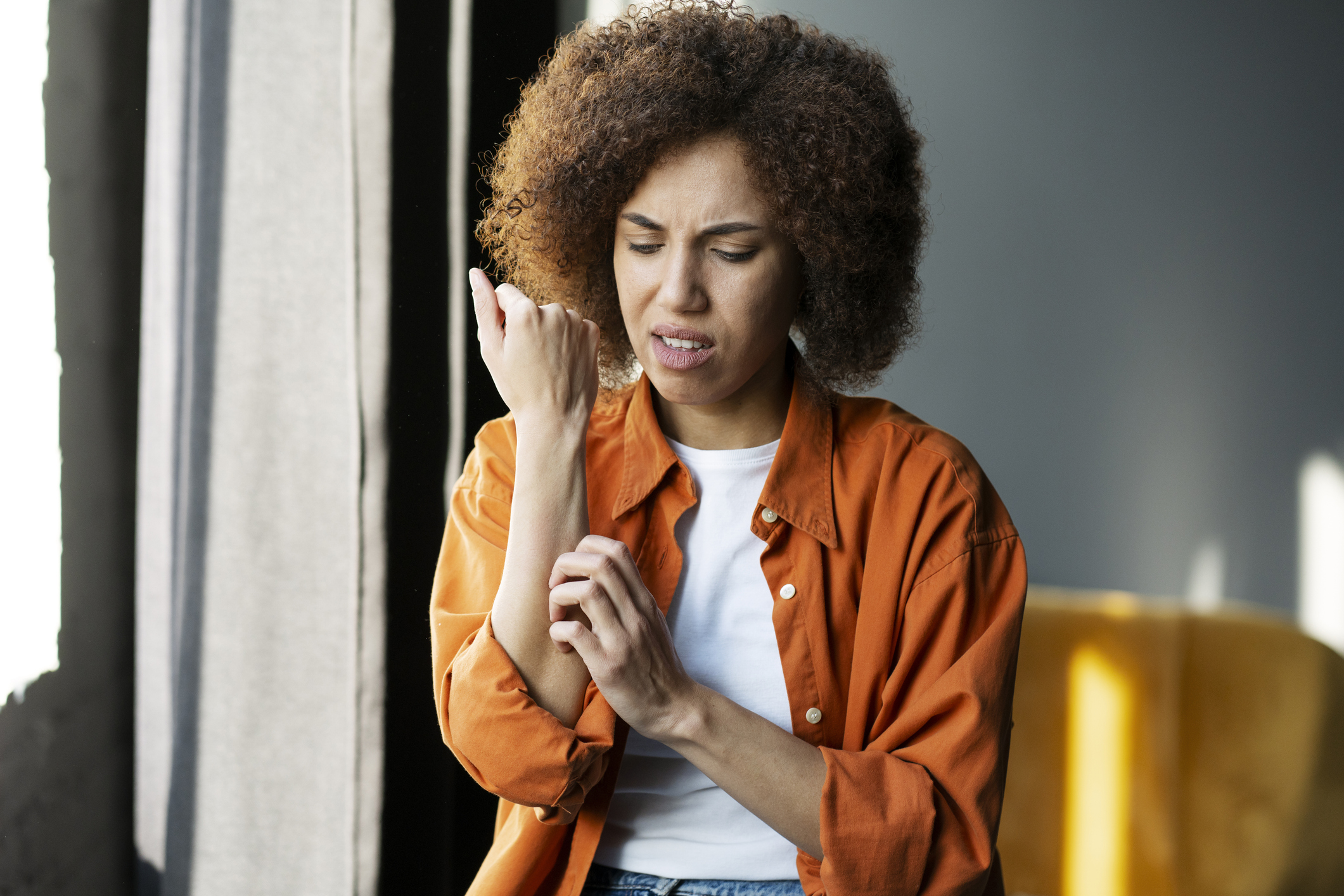Nearly everyone will experience rashes in their lifetime, but that doesn’t make them easy to deal with. Skin rashes can be more than just a nuisance; they can lead to discomfort, embarrassment, and even anxiety.
Whether you’re dealing with itchiness, redness, or scaling skin, knowing the type of rash you have and how to treat it can help you find relief. In this blog, we will cover the most common types of rashes, their symptoms, treatment options, and when to seek professional help.
Rashes Demystified: Understanding Common Types & Treatment Options
What is a Rash?
A rash is a noticeable change in the texture or color of your skin that often comes with irritation, swelling, itchiness, or pain. Rashes can occur due to various factors, including allergies, infections, heat exposure, and reactions to medication.
Common Types of Rashes
Here are some of the most prevalent rashes, their characteristics, and treatment suggestions:
1. Contact Dermatitis
- Symptoms: Red, itchy, burning, or stinging skin, occasionally erupting in blisters.
- Causes: Irritants or allergens such as soaps, detergents, poison ivy, and metals.
- Treatment: Avoid scratching the irritant. Over-the-counter hydrocortisone cream or oral antihistamines may help reduce inflammation and itching. Severe cases might require a prescription corticosteroid.
2. Atopic Dermatitis (Eczema)
- Symptoms: Dry, red, and itchy patches, often crusted or scaly.
- Causes: Often hereditary and linked to allergies and asthma.
- Treatment: Moisturizers to keep skin hydrated, topical corticosteroids for inflammation, and antihistamines for itching. Severe cases may require oral medications.
3. Psoriasis
- Symptoms: Thick, red patches covered with silvery scales, typically found on elbows, knees, and scalp.
- Causes: An immune system dysfunction leading to rapid skin cell production.
- Treatment: Topical treatments like corticosteroids, light therapy, and systemic medications for more severe cases.
4. Shingles
- Symptoms: Painful, blistering rash, often in a band-like formation. Accompanied by fatigue, fever, and general malaise.
- Causes: After you’ve had chickenpox, the virus stays in your body. Shingles is caused by the reactivation of this virus (varicella-zoster).
- Treatment: Antiviral medications to reduce severity and duration, along with pain relievers and cooling compresses.
5. Ringworm
- Symptoms: Ring-shaped, itchy rash with clear centers and red edges.
- Causes: Fungal infection, not caused by worms.
- Treatment: Topical or oral antifungal medications.
6. Heat Rash
- Symptoms: Small red bumps on the skin, often in hot, humid conditions.
- Causes: Blocked sweat ducts due to excessive heat.
- Treatment: Keeping the area cool and dry, using soothing creams or ointments.
7. Rosacea
- Symptoms: Redness and pimple-like spots, primarily on the face.
- Causes: Unknown, but often triggered by sunlight, stress, and certain foods.
- Treatment: Avoiding triggers, topical treatments, and oral antibiotics in severe cases.
8. Impetigo
- Symptoms: Red sores that develop into blisters and ooze, leading to honey-colored crusts.
- Causes: Bacterial infection, commonly affecting children.
- Treatment: Antibiotics (topical or oral), depending on severity.
When to Seek Professional Help
Most rashes can be treated at home, but certain signs warrant a visit to a healthcare provider:
- Fever, joint pain, or sore throat accompanying the rash.
- The rash has blistered, is infected, or changes in color.
- Rapid spread of the rash, indicating an allergic reaction or infection.
- Unresponsiveness to at-home treatments.
If you’re experiencing discomfort due to a rash, consulting a dermatologist can provide you with targeted treatments and a comprehensive evaluation tailored to your individual needs.
FAQs About Rashes
1. What are the first steps to take if I develop a rash?
Start by identifying potential irritants or allergens you’ve encountered recently. Avoid known triggers and keep the area clean and dry.
2. Can stress cause skin rashes?
Yes, stress can exacerbate certain skin conditions like eczema and psoriasis, leading to flare-ups.
3. Are all rashes contagious?
Not all rashes are contagious. Rashes caused by allergies are not contagious; however, those caused by infections (like shingles or ringworm) can be.
4. When should I consider a patch test?
If you suspect an allergic reaction, a patch test with your dermatologist can help identify specific triggers.
The Ultimate Guide to Handling Rashes and Soothing Your Sking
Rashes can be frustrating, but understanding their types, symptoms, and treatments can make management easier. Always consult a healthcare provider or dermatologist about any persistent or severe rash for appropriate evaluation and care.
At Rodgers Dermatology, we’re here to help you navigate any and all skin concerns. Don’t wait—schedule an appointment today for expert dermatological advice and personalized treatment options! Your journey to healthy skin starts with a single step.
Book Your Rash or Skin Assessment Appointment Today
Discover the exceptional care you deserve at Rodgers Dermatology’s newly opened location in Prosper, TX. Our expert team is dedicated to providing personalized dermatological solutions tailored to your unique skin needs. Whether you’re seeking treatment for a specific skin condition or looking to enhance your overall skin health, we are here to support you every step of the way.
Don’t miss the opportunity to prioritize your skin care—schedule your appointment today and embark on the journey to a more confident you!

